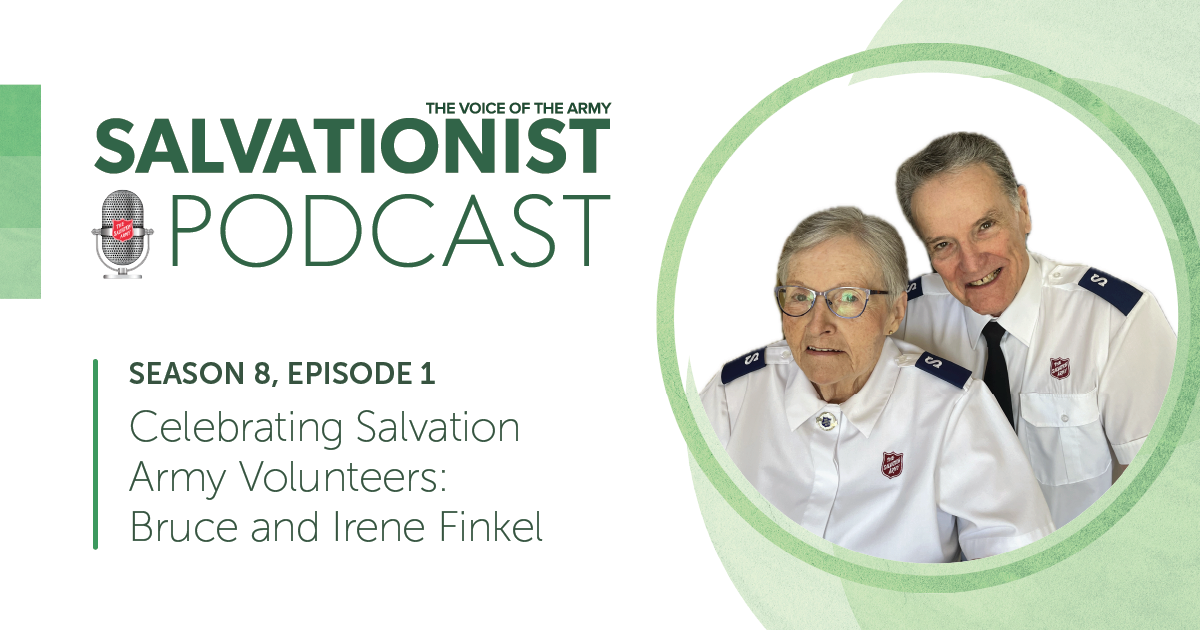 Over the past two decades, The Salvation Army in Canada and Bermuda has experienced a significant decline in church membership and Sunday attendance. Of particular concern has been the loss of many young people. In 2007, the territory began a research project with the hope of gaining a better understanding of the rates and causes of young adult attrition. James Pedlar, a young Salvationist pursuing a doctorate in systematic theology at the University of Toronto, was tasked by The Salvation Army to oversee this project.
Over the past two decades, The Salvation Army in Canada and Bermuda has experienced a significant decline in church membership and Sunday attendance. Of particular concern has been the loss of many young people. In 2007, the territory began a research project with the hope of gaining a better understanding of the rates and causes of young adult attrition. James Pedlar, a young Salvationist pursuing a doctorate in systematic theology at the University of Toronto, was tasked by The Salvation Army to oversee this project.
After two years of conducting surveys, interviews and focus groups with hundreds of young people, including active Salvationists and those who had left the Army and/or the Church, Pedlar completed the research project. He spoke with John McAlister, senior editor, about the results of his research and his recommendations.
What are the demographic trends?
Most researchers agree that the North American Church will continue to see a decline in church membership and denominational loyalty. As church attendance in other evangelical and mainline denominations has declined in recent decades, it is important to note that the Army is not unique in facing these challenges.
There are approximately 4,500-5,000 young adults (ages 16-35) associated with corps in this territory. While there were more corps reporting a decrease in young adults over the past five years, the past two years have seen a small net gain across the territory. Corps size is the most significant factor influencing attrition rates. Larger corps fare better in attracting and retaining young adults.
When it comes to youth retention, what are the significant issues?
It was challenging to summarize the hundreds of hours of conversations that took place over the past two years, but five themes did emerge that cover the major issues raised. These are: authentic discipleship; unity in mission and diversity of expression; distrust of Salvation Army structure; a variety of views on soldiership and membership; and the desire for changes to officership.
What is the primary reason that most youth leave the Army?
Each person is unique, and encounters the Army through a particular set of events, circumstances and relationships. There's no simple cause or single issue that was a major factor in influencing people to leave the Army. However, some left because of a particular issue, while others left simply due to circumstances in their life. In addition, some left amid personal conflict, while others were able to leave on good terms.
What hope can the Army find in this report?
While this report has given voice to many concerns and criticisms of the current state of the Army, there is reason to hope. I met with some wonderful young Salvationists who continue to believe that there is a future for them in the Army. Some are committed to staying the course, no matter what, and others are hopeful for change in the years to come.
Territorial Young Adult Research Project
Click on thumbnail to view
Click here to download pdf
The strongest reason for the Army to be hopeful for the future is that the idea of The Salvation Army still has a universal appeal. I did not meet one young adult who objected to the mission of the Army. Even young people who have left the Army are still excited about the heritage of the Army, the strong emphasis on mission, and the combination of evangelicalism and a commitment to social justice.
Youth are calling for the Army to be truer to its founding vision and roots. Their feedback is a call to reform and renewal.
What recommendations have you offered?
One of my tasks was to recommend possible action to address the issue of young adult attrition. I presented seven priorities to territorial leadership based on the findings from the entire research project. These were developed with input from 40 young adults from across the territory.
These are the recommendations:
1. Fostering authentic discipleship. Young adults are looking to be in discipling relationships that are characterized by genuine care, interest and transparency. This includes being given opportunities to serve according to their gifts and passions. They are also looking for substantial teaching and the freedom to ask questions and dialogue on important matters of faith. The Army can address these concerns by raising awareness about the importance of relational discipleship, promoting mentoring and equipping Salvationists to be effective mentors, and providing leadership opportunities for young adults.
Youth are calling for the Army to be truer to its founding vision and roots
2. Focus on empowering smaller corps. Most of the corps in the territory are small, and tend to have a more difficult time attracting and retaining young adults. A concerted effort needs to be made to support them in their youth ministry. As young adults are looking for relational discipleship, and leaders in small corps have the opportunity to offer them a great deal of attention, they may actually have an advantage over larger corps. The Army can help smaller corps embrace their own strengths, develop their mentoring skills, and foster opportunities for networking with other Salvation Army and Christian resources, such as divisional youth gatherings.
3. Focus on post-secondary transition. About two-thirds of young adults who leave the Army do so before the age of 25. Often this happens during the transition to post-secondary education, when they are exposed to critical thinking and leave their supportive church family. A particular emphasis on helping young adults navigate this change in their lives would be beneficial. Some possibilities could include being intentional about making connections between the sending corps and the new community, and providing opportunities for dialogue, discussion and thinking.
4. Build unity in mission and encourage diversity in expression. While young adults are still attracted to the Army's mission, they are divided on the traditional trappings of denominational identity. There doesn't seem to be unity when it comes to things such as worship style and mode of dress. To address this, the Army could continue to engage youth in dialogue about the essentials of mission, and the negotiables of form or method. In addition, leaders can communicate that mission takes priority over institutional identity, and work for diversity of expression at public events so that youth feel that they are a part of the broader Army culture.
5. Increase opportunities for mission. As youth are enthusiastic about Army mission, more ways should be found to engage them in mission opportunities. Short-term mission trips, either overseas or within the territory, can help foster a sense of unity with the wider Salvation Army family. As well, encouraging an integration between corps and community and family services can provide opportunities for engagement.
6. Remove real and perceived barriers to officership. Among some young adults, officership has developed a negative reputation. This needs to change in order for the Army to meet its future leadership needs. This will involve reminding officers of their role in influencing the perception of youth about officership, and exploring the conditions of officership, such as training models and the appointment system.
7. Build trust with leadership. For young adults, the authority of a leader is established relationally, not positionally. Salvation Army leadership, because of its hierarchical position-based structure, is in a challenging situation with younger generations. It's important for leaders to take the time to get to know their young people. Youth tend to be skeptical of institutions of all kinds, so Army leaders at all levels should recognize that the trust of young people must be earned and re-earned in the context of relationships. It is essential that the Army be transparent about their decision-making processes, and provide ways to give youth a forum to share their views.
How can individual Salvationists respond to the issue of youth attrition?
My biggest hope is that this report will start conversations. Local Salvationists should take the time to connect with young people and find out what they think. Get them engaged in decision-making processes in the church, and really listen to their perspective because it's probably going to different. Give them opportunities to have a voice. They want to feel respected and a part of what's happening. Building stronger relationships with youth will help corps overcome any deficiencies they may have.









Just wanted to say, "nice work on the research!" You did your job and now it's up to those in The Salvation Army structure to respond with a vision to move forward and to take action and implement strategies.
It's great that you probed the Army specific context for youth leaving the "Church." As you mentioned, this isn't only an Army problem. It's a universal shift happening in our society and culture right now. It might be interesting to note that we are living in a unique time in North American history where for the VERY FIRST TIME, we have an entire younger generation who have grown up outside the walls of the church and as such, do not have a Judeo-Christian moral value system. This is not like in the past where a young person grows up in the church, gets into their teens/early adulthood and gets restless, walks away from the Church to test the waters then comes back later. Our younger generation of today (speaking of society & not Army) aren't in the Church in the first place so they aren't "coming back" at all because they were never there.
Robert, I like your comment from Oct 15. You hit the nail on the head. You've basically pointed out that the church hasn't listened and responded to the concerns of the people and the changing of our culture.
Are we listening? Will we listen now? If not now, when? Will we take action and adapt our methods and form (obviously without selling short the Gospel)?